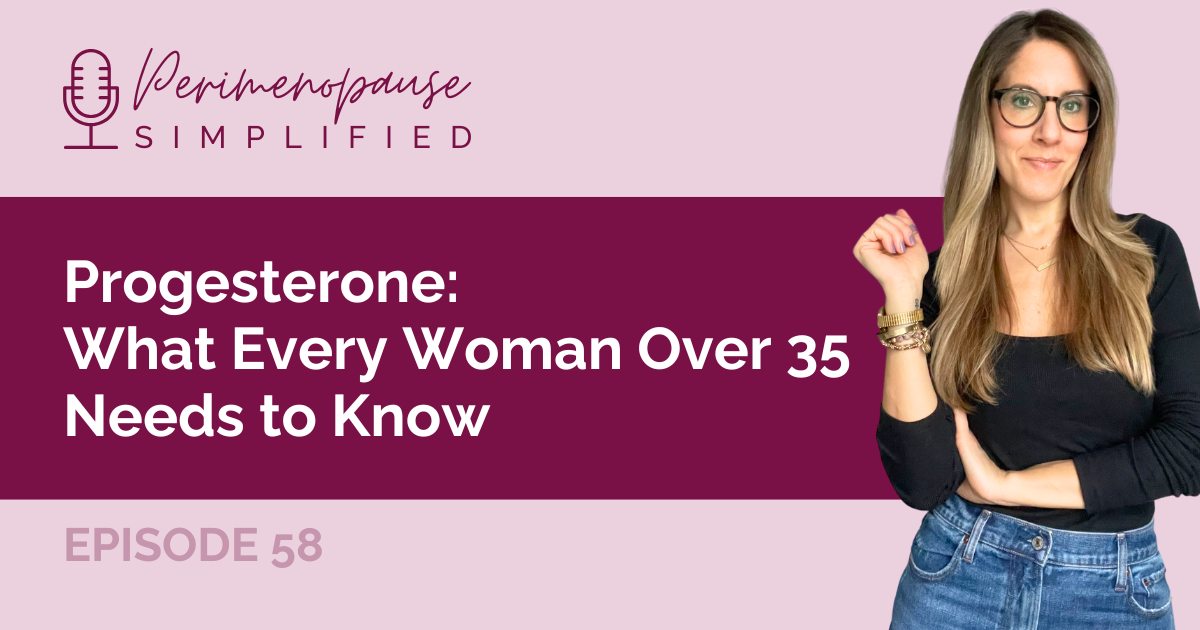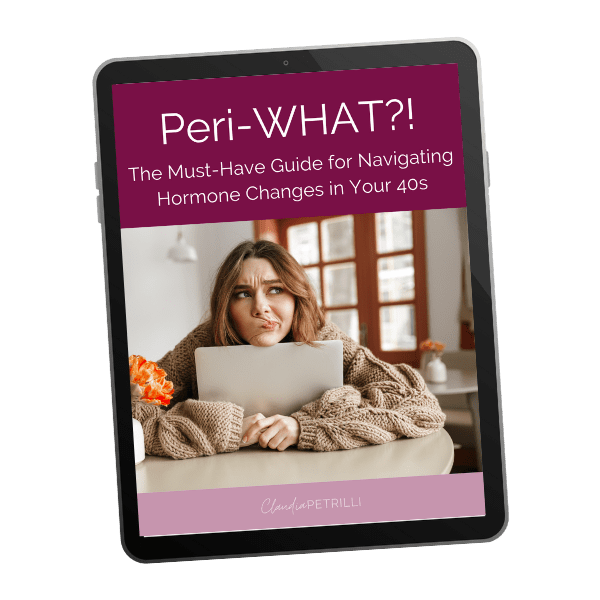
58. Progesterone: What Every Woman Over 35 Needs to Know
Don’t Miss An Episode!
Progesterone is one of the most essential hormones for women’s health. But after 35, you start to lose this amazing hormone. In this episode, Claudia dives into what you need to know about progesterone, why she believes most women over 35 should replace it, common questions she gets about progesterone, and more.
In this episode, we covered:
- Symptoms of low progesterone
- Anovulatory cycles in perimenopause
- Why estrogen is not the enemy
- How stress can hinder progesterone
- Benefits Claudia experienced with progesterone HRT
- Misconceptions about progesterone
- Forms of progesterone
- To cycle or not to cycle progesterone
- And more!
Mentioned in this episode:
Episode 32 with Carol Petersen
👉🏼Save Your Spot for Claudia’s FREE Masterclass on April 17th:
🔥 Energy, Mood & Metabolism: How to Fix the Top Perimenopause Struggles After 35! >>> RSVP HERE
The Importance of Progesterone for Women’s Health
Progesterone is one of the most essential hormones for women’s health, critical for balanced moods, good sleep, healthy periods, and much more. It’s often referred to as the “calming hormone” because of its ability to soothe the nervous system, promote relaxation, and counterbalance the effects of estrogen.
While estrogen is often seen as the dominant female hormone—and sometimes unfairly blamed for symptoms like weight gain, bloating, and mood swings—it’s not the enemy. Estrogen is vital for bone health, cardiovascular function, and cognitive sharpness. But we need to counterbalance it with progesterone.
How Progesterone Declines Over Time
Progesterone is typically the first hormone to decline in your mid-30s. This can be due to stress, diet, lifestyle, use of hormonal birth control, and the natural aging process. Around the age of 35, we start having anovulatory cycles, where we don’t ovulate every month. If we don’t ovulate, we don’t make progesterone.
So, we can be losing it years before estrogen levels drop. This can lead to ‘unopposed estrogen’ or what is often called ‘estrogen dominance’—not necessarily because estrogen is too high, but because there’s not enough progesterone to keep it in check.
Symptoms of Low Progesterone
Without adequate progesterone, women can experience a range of symptoms, including:
-
Anxiety
-
Poor sleep
-
Irrational fears
-
Low mood
-
Heavy or painful periods
-
Fibroids
-
Breast tenderness
-
Bloating
-
Migraines
-
Increased sensitivity to stress
It’s a vicious cycle—progesterone helps us adapt to stress, but stress halts its production. When we’re stressed, cortisol takes over, leading to even lower progesterone levels.
That’s why I believe most women over 35 who are struggling with any of these symptoms should consider some form of progesterone support. Restoring progesterone levels can be life-changing, as it was for me when I started experiencing symptoms in my mid-to-late 30s.
A Few Misconceptions About Progesterone
-
Many providers confuse progesterone with progestin (found in birth control), but they are not the same.
-
Some believe progesterone is only needed if you have a uterus to protect against uterine cancer, but it has a range of health benefits beyond that.
-
The myth that if estrogen is low, progesterone isn’t necessary—when in reality, we need both.
Different Forms of Progesterone
There are several forms of progesterone, each with its pros and cons:
-
Oral Micronized Progesterone (Prometrium) – Effective for sleep but can have a sedative effect, leading to grogginess or dizziness.
-
Compounded Progesterone (Oral or Topical) – Customizable but may require adjustment to find the right dose.
-
Topical Progesterone Creams – Convenient but may not provide enough relief, depending on dosage.
-
Troches and Vaginal Applications – Alternative delivery methods with different absorption rates.
Can You Support Progesterone Naturally?
If you’re on the younger side, you can try to support progesterone naturally through a healthy diet, stress management, and supplements like:
-
Magnesium
-
Vitamin B6
-
Zinc
-
Herbs like Vitex
However, as you get older, natural support alone may not be enough. Ovarian production slows, and in my opinion, hormones replace hormones.
When Is the Best Time to Test Progesterone?
Testing progesterone or estrogen, especially in perimenopause, is tricky because they fluctuate. The optimal time to test progesterone is days 19-21 of a regular 28-day cycle.
Is Oral Progesterone Better Than Topical?
Not necessarily. Oral progesterone is my preferred method at the moment, but topical has its place. The best option depends on the individual.
Can Progesterone Trigger Estrogen-Like Side Effects?
Any time we start hormones—whether estrogen, testosterone, or progesterone—symptoms can arise as they all impact each other. Some women may feel worse before they feel better. However, for me, progesterone made a huge difference in my anxiety, mood, sleep, and periods.
Could Too Little Progesterone Increase Cancer Risk?
If you are taking estrogen, you need to take progesterone (if you have a uterus) to protect against uterine cancer. The minimum recommended dose is 100 mg for at least 12 days per month. If you are not taking estrogen, lower doses may still provide benefits.
Do You Need Progesterone If You Had a Hysterectomy?
No, but progesterone still offers benefits such as better sleep, improved mood, brain health support, and a counterbalance to estrogen’s effects.
Do I Recommend Over-the-Counter Progesterone?
Yes! There are some great brands available. One I like is Ona’s Natural, as they use higher doses.
Claudia Petrilli is a Functional Health Coach, Integrative Nutrition Coach, Women’s Health Educator, and creator of The Perimenopause Method. Having experienced debilitating periods, digestive issues, a sluggish thyroid, a pituitary tumor, and perimenopause symptoms in her late 30s, she knows exactly what it’s like to get dismissed by doctors and spend years searching for answers.
Connect with Claudia:
BOOK A CLARITY CALL WITH CLAUDIA HERE
FREE GIFT: Peri-What?! The Must-Have Guide for Women 40+ Navigating Hormone Changes
FREE GIFT: Perimenopause Daily Checklist
WORK WITH US: The Perimenopause Method
HRT COURSE: Perimenopause HRT Roadmap
QUESTIONS? EMAIL: claudia@claudiapetrilli.com
Have a question or episode topic suggestion? Please email: claudia@claudiapetrilli.com






